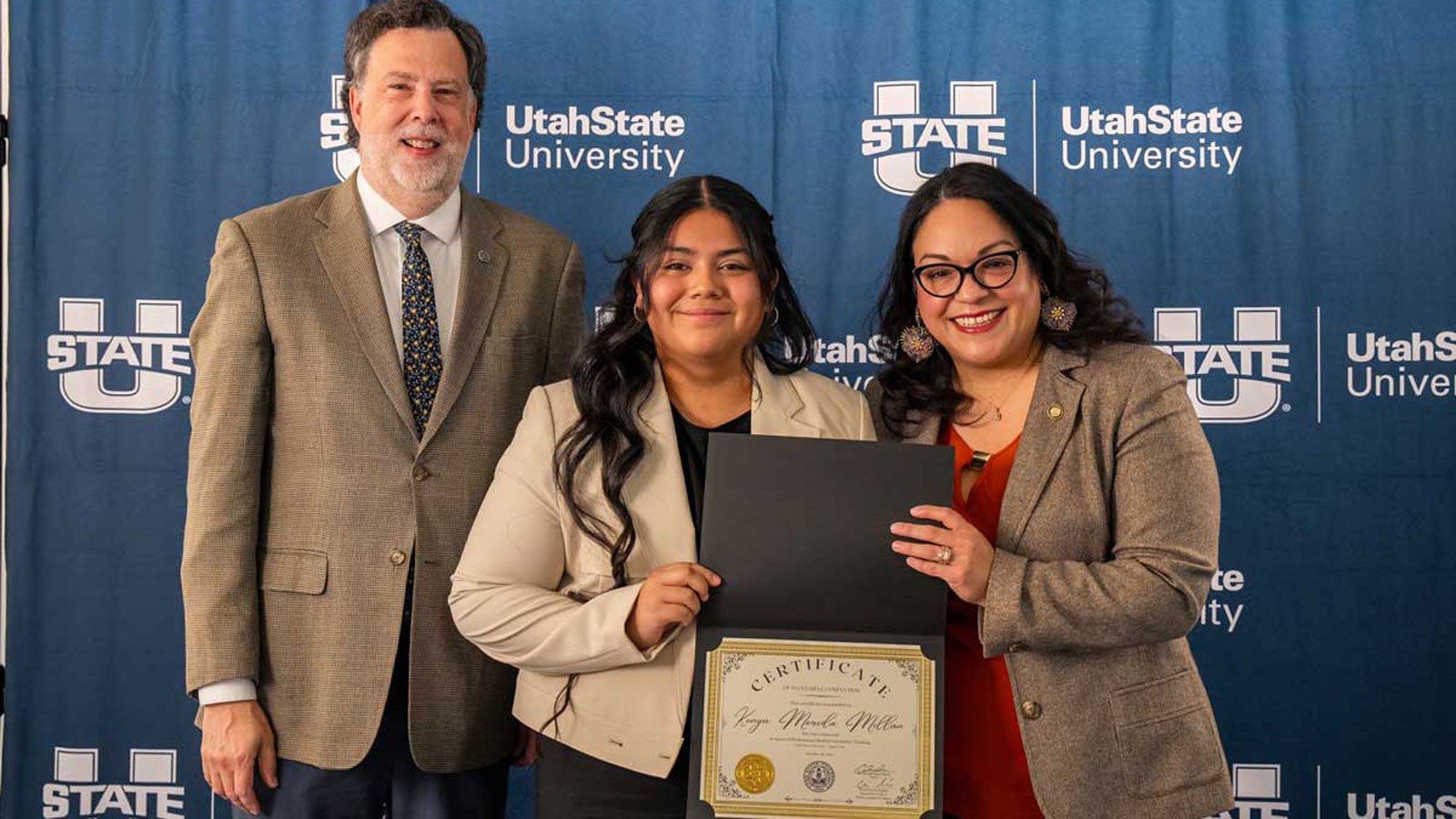USU Honors First Cohort of Trained Medical Interpreters
By Andrea DeHaan |
Utah State University honored students who now hold certificates of completion in medical interpretation with a reception on Oct. 28.
A dozen students, all Spanish speakers, just completed a free eight-week course offered to community members through Utah State University’s new “Bridging the Gap” interpreter training program.
Senate Minority Leader Luz Escamilla, D-Salt Lake City, was among those who spoke to a room full of students and their families gathered in the David B. Haight Center on USU’s Logan campus. Calling graduates of the community-based program “heroes,” Escamilla said the newly trained students would help provide critical and potentially lifesaving services for Utah’s residents.
A former medical interpreter, Escamilla sponsored the state appropriation that allowed USU to develop an array of academic programs to prepare more certified medical interpreters. She thanked the university for recognizing medical interpreting “as a tool in the industry of health care” and for “giving it the visibility” that an academic institution can provide.
The Oct. 28 honorees represent the first cohort of USU students trained in medical interpretation under a program started at the university this summer. The 40-hour course is the first step toward national licensure and is reflective of growing demand in the state of Utah.
“We have a lot of community members in our state who are not fluent in English, or they don't know the specific English used for medical settings and they are struggling,” said Program Co-Director Elsa Pérez. “They are struggling to have a quality health care service. They're struggling to [communicate] with their physician. And so, this is a response, and we're here to help them.”
Trained interpreters facilitate access to health care for individuals from diverse language backgrounds, and there is a related shortage of interpreters in social service settings throughout the state, which could prevent some Utah residents from receiving the services they need.
Escamilla said the USU students were getting “more than a certificate.”
“We will be literally saving lives in some instances,” she said. “Without a high-quality medical interpreter, people's lives are at risk, and that's why it's against the law not to have a qualified medical interpreter.”
Through a continuing education program called “Bridging the Gap,” the Department of World Languages and Cultures is offering medical interpretation training to non-enrolled community students at no cost. This first section met on Saturdays so that existing professionals and non-traditional students could access the course. One student in the class drove from Lehi each weekend to participate in the free training.
The department is also offering a university section this fall, which will see additional students trained in medical interpretation by the end of the semester. USU’s new programs in medical interpretation and translation are housed in the College of Humanities and Social Sciences.
Early evidence for the program’s success was underscored by Karina Trujillo, who was selected to address her classmates during the event. Trujillo has already used her training to leverage a new job in the medical field and sees potential value in continued education for health care professionals and those looking to become interpreters.
“This course opened up a huge opportunity for me and I am very thankful for it,” Trujillo said. “Mentioning that I was taking the class through Utah State University made a big difference when they decided … to offer me the position. My new coworkers were asking me about the certification.”
Course instructor Pérez said this first cohort is just the beginning and that the university will continue working with the state and the community to meet the demand, calling medical interpretation one of the fastest-growing careers in Utah.
WRITER
Andrea DeHaan
Communications Editor
College of Humanities and Social Sciences
435-797-2985
andrea.dehaan@usu.edu
CONTACT
Crescencio López González
Associate Professor of Latinx Studies
crescencio.lopez@usu.edu
TOPICS
Health 308storiesComments and questions regarding this article may be directed to the contact person listed on this page.







